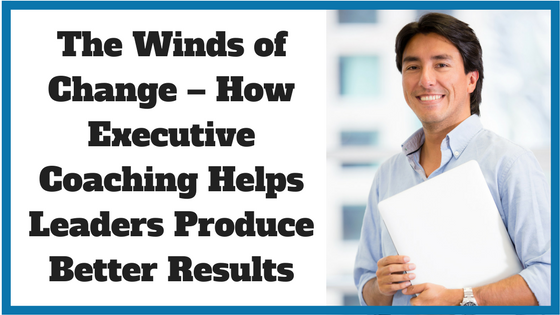The Winds of Change – How Executive Coaching Helps Leaders Produce Better Results
It has been my privilege to work with, and coach, hundreds of executives over the course of my career, most of whom were in the process of a career transition – either internally with their current employer or externally where they were seeking new work. My most satisfying career accomplishments have been in executive coaching where clients get that ah-ha; discovering that to become a better leader and to add greater value at work it does not take forever.
Clients learn that to cross the career sea, positioning and good judgment get the wind at your back, and help to set the sails properly to smooth their travel. An executive coach helps with both positioning and experienced analysis. If you are considering hiring an executive coach here are some things to consider:
Begin with the end in mind
Those who benefit most from executive coaching are those who know what they want to accomplish or who have a good sense of the professional they wish to become and want help to get there sooner by leveraging this type of support. In my experience, leaders are made, not born – meaning that most leadership skills come with experience and one’s abilities grow over time. Those who are the most intentional about their growth reap the best benefits. Even if coaching was not your idea, but perhaps that of a colleague, your employer or some other resource – do your due diligence, so you know what to expect and be clear about what you wish to accomplish. If you are not clear, invite assistance from the coach to help you gain clarity.
So, what do you want or need to improve? Do you know how to up-level your contributions, so you add even more value to the benefit of your employer, your team and yourself?
Most usually clients ask for assistance with:
- People skills or communication skills
- Follow through or time management
- Decision-making processes and tools
- Effective conflict management
Evaluate feedback you have been receiving up until now and decide what you would like to change. Are any of the results bugging you? Do you need to insulate your hot buttons or to shine the light more on your untapped potential? Most importantly, what do you need to change to make the distinct shifts you wish? Set sail on the journey with an executive coach as a guide to help you become that leader whom you have imagined.
Be coachable
All my clients have been sharp, bright, talented professionals, who are highly capable of doing most anything to which they set their minds. So, what is it about working with a coach that makes a difference? When one is coachable, the executive is open to hearing a fresh perspective and viewing situations from another set of sharp eyes. The belief is that one-on-one interaction with an objective third party (in this case, the coach) can provide a focus that other forms of organizational support simply cannot. The key here is being open to hearing the feedback, accepting the support and testing it against your own frames of reference for validity while being willing to lean-in it to trying new approaches and using new tools which may result in your producing a better outcome – solving problems better.
Take action
Be willing to commit to positive change. The follow on work of executive coaching is that the executive leader listens and decides what’s best for him or herself within their organization. They are willing to try new behaviours and observe and test the results.
Executive coaches are knowledgeable in people, relationships, organizations and behavioural change. When an executive leader is struggling to learn how to manage him or herself best, plus engage with others, that is the sweet spot for inviting the advice of an executive coach. It is the coach’s perspective, their extra set of sharp eyes, which allows a better decision to be made and a better result to occur to the credit of the executive leader.
Good executive coaches quickly grasp an executive leader’s situation, challenge the assumptions and nuances of the situation, and bring credible, fresh ideas to the mix. It also helps that the executive leader has a good mentor within the organization to also leverage their input as a complement to the coaching advice. Coaching works best when key people in the executive leader’s world stand solidly behind them. They need to provide tailwinds, not headwinds.
In conclusion, navigating the winds of change at work is aided by the strong support of a good executive coach.  If you want improved relationships and improved results seek out the services of someone who can effectively listen, advise and help you – then watch out as you hit new milestones.
Thinking of enlisting the help of an executive coach for you or for someone else in your organization? Connect with Lynden Kidd, browse our directory of career coaches and get a FREE consultation or request a personalized coach recommendation!
About the Author Lynden Kidd
Lynden Kidd is the CEO and Chief Career Strategist with Captivating Careers. A successful and sought after executive coach, trainer, author, and speaker, she is a hiring process expert. As an accomplished career consultant, Lynden has interviewed thousands of job seekers, led more than 300 career development training sessions serving 500+ job seekers resulting in employment and enhanced job performance for hundreds of professionals.


